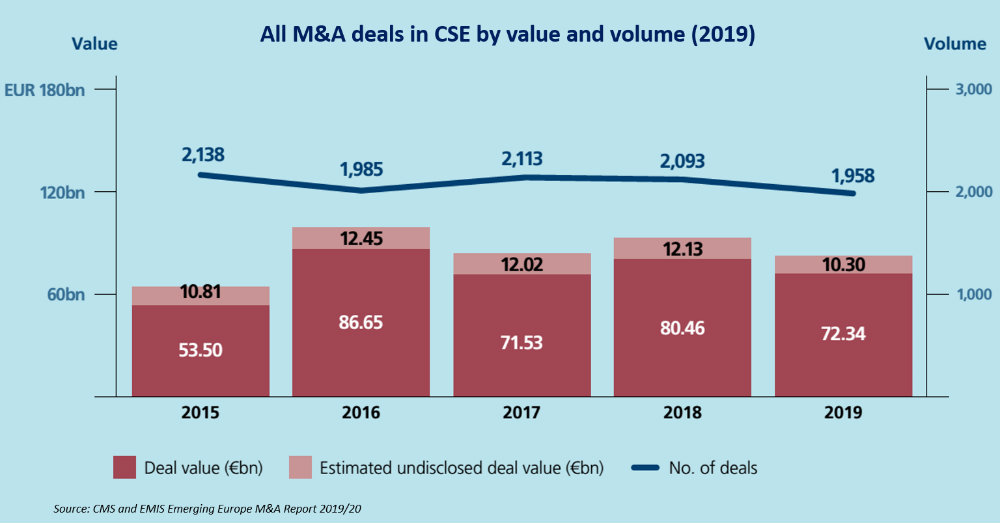
(©geralt, CC)
CSE remains a target for international investors. As authors of the report wrote, values of transactions went down partly because there were fewer megadeals. Only two transactions were worth more than EUR2bn, while in 2018 there were six. The pace of growth in the CSE and the rising purchasing power of its population has grabbed the attention of investors across the globe. It is no longer a target because of its proximity to western markets. The region not only provides a pool of labor for the technology sector, it also produces a steady flow of start-ups, some of which have joined the ranks of unicorns.
Led by Hungary, Poland and Romania, with GDP growing at more than 4 per cent, CSE is ahead the West in terms of economic growth. The Czech Republic, Slovakia and Slovenia enjoyed growth above 2 per cent, comfortably more than the UK and France, while Germany flirted with recession. Projections for 2020 point to weakening growth, but with CSE on course to lead the pack.

M&A deals in Poland
As a newcomer to the ranks of Europe’s developed countries, Poland boasts a large domestic market and strong consumer demand. In contrast to its buoyant economy, its stock market was one of the world’s worst performers in 2019. However, investors largely ignored political concerns. Deal values rose by 68.3 per cent to EUR10.93bn, lifted by an increase in the number of EUR200m-plus transactions. The deal volumes fell by 20.1 per cent to 258. Real estate and construction sector had 92 transactions, 37 in manufacturing and 28 in services.
Poland’s top 5 deals were:
- Temasek Holdings; Poland’s Development Fund, Singaporean Industry Super Holdings acquired 100 per cent of DCT Gdansk stake. The value of transaction was EUR1.18bn (sector: transportation & logistics).
- Accor first bought additional 33.1 per cent in Orbis via a tender offer and then sold its entire 85.8 per cent stake in the real estate operations of Orbis to AccorInvest for EUR1.06bn (sector: real estate).
- Hungarian Wing acquired 56 per cent of stake in Echo Investment for EUR467m (sector: real estate).
- Polish Bank PKO BP acquired 94.4 per cent of Prime Car Management for EUR431.6m (sector: services).
- Austrian Immofinanz acquired Building A of the Warsaw Spire Complex for EUR386m (sector: real estate).
Out of the CSE top 10 real estate and construction deals six took place in Poland:
- Above-mentioned Accor, Wing and Immofinanz deals, and
- Israeli Gazit-Globe acquired 40 per cent of shares in the Atrium European Real Estate for EUR565m. This transactions also included properties in Czech Republic, Russia and Slovakia.
- Madison International Realty acquired 66 per cent of shares in Capital Park for EUR360.24m.
Other CSE countries
According to CMS Ukraine is the country to watch in 2020 as the reforms under new president Volodymyr Zelenskiy start to kick in. Transaction activity was up 25.7 per cent, and values were up 26.3 per cent, and both have been at their highest levels since 2013.
Russia had almost the same number of deals as a year before — 602 transactions. Some megadeals in the energy sector resulted in an increase of value by by 32.2 per cent to EUR35.82bn.
The pace of economic growth in Hungary was not matched by M&A activity as transaction numbers fell 10.9 per cent and values dropped 64.3 per cent against the previous year, when there were two EUR1bn-plus telecoms deals. The Czech Republic saw deal values rise by 4.2 per cent to EUR5.67bn, lifted by the EUR1.8bn takeover of gas distributor innogy Grid by a consortium led by Macquarie of Australia, although deal volumes dipped 16 per cent. In Slovakia volumes were close to an all-time high, up 9.3 per cent to 59, and values more than doubled to EUR1bn, boosted by the PPF Group’s purchase of Central European Media Enterprises and Vivendi’s purchase of M7 Group.
Major deals in Romania included a EUR506m fund raising led by US hedge fund Coatue in robotics company UiPath, valuing the business at EUR7bn. Deal numbers rose 10.0 per cent and values were 50.1 per cent lower than in 2018, when Vodafone bought Liberty Global’s operations in eastern Europe. Bulgaria enjoyed several large deals, including the sale of Vivacom and the award of the concession to run Sofia’s Airport to French group Meridiam and Munich Airport. Along with a clutch of large media deals, including the sale of CME and Nova Broadcasting, they helped push values 10.9 per cent higher overtaking 2018’s record value. The number of transactions showed a small year-on-year decline, in line with expectations.
Croatia saw volumes fall 17 per cent and values up 9 per cent, with one of the highlights being the sale of Tele2 to BC Partners-owned United Group of the Netherlands for EUR220m. Serbia’s largest deal was the sale of Koncern Bambi to Coca-Cola, but after a EUR1bn-plus mining privatization in the previous year, values were down 84 per cent and volumes by 25.4 per cent. In Slovenia, deal numbers were slightly down at 40 and values down 31.5 per cent at EUR1.4bn. Financial services was a key driver for Slovenia, including the EUR444m sale of Abanka to rival Nova KBM and the purchase by Hungary’s OTP Group of a 99.7 per cent stake in SKB Banka from Société Générale. Among the smaller markets, deals and values were down in Bosnia and Herzegovina, while Montenegro enjoyed a rise in values despite a drop in volumes.
Increased activities of PE and VC
The number of transactions done by PE funds continued to rise and with 318 deals PEs set a new record. Financial investors, such as asset managers, pension and sovereign funds, supranational finance institutions and large investment banks, were involved in 16.2 per cent of all transactions. Deal values were similar to 2018 and included EUR1bn-plus deals. The largest was the EUR1.9bn purchase of Central European Media Enterprises by PPF Group of the Czech Republic.
Activity in private equity was spread across the region, although the larger economies attracted the most attention. Private equity investment was one of the drivers behind the rise in deals in telecoms and IT, while manufacturing, wholesale and retail and energy witnessed increased activity. 91 of all PE deals were in real estate and construction, 57 in telecom and IT, and 39 in manufacturing.
Foreign and regional players
One of the factors blamed for falling deals in western Europe was retrenchment by American investors, but this was not the experience in CSE, where US investors were enthusiastic participants. The US was a leader by transaction numbers, with 122 deals, nearly half more than in the previous year. By value (EUR5.84bn), the US investments were in line with the previous year, but it lagged behind China which more than doubled its investment to EUR6.38bn. China was also involved in more deals than the previous year.
Other major investors included the UK, Germany, Austria, France and Spain. Asia’s growing importance was marked by a big rise in investment from Japan and Singapore, and a string of projects from South Korea.
The number of cross-border deals was 14.6 per cent higher at 1,163, while the value of those deals decreased by 4.4 per cent to just over EUR51bn. Meanwhile, domestic deal volumes were 26.3 per cent lower at 795 and their total value down 21.3 per cent at EUR21.3bn.
Russia, Poland, Turkey and the Czech Republic were the busiest regional investors, however Russia was the only one to increase investment. As companies grow in size and confidence, their ability to do international deals increases and growing numbers have set their sights beyond their domestic boundaries.
Real estate and logistics are the M&A leaders
The office and retail assets remain popular, the rise of eCommerce has led to increasing interest in logistics, warehouse and distribution centers. Bricks-and-mortar retailing has not been such an active sector and that is reflected in yields on shopping centers, which are rising, while yields on eCommerce centers are compressing.
Poland and the Czech Republic are leading the way as developers take advantage of lower property prices and labor costs, but also from solid infrastructure and proximity to the strong German market. Slovakia, Hungary and Romania are also seeing growth, but less so Bulgaria and Ukraine. In contrast, Romania cannot rely on supplying the West, although it could become a hub for the Balkans. It still requires improvements in infrastructure and a more liquid real estate market.
According to CMs experts this year eCommerce is likely to continue being the driving factor of investment into logistics assets. CSE can deliver the construction of high quality properties with good transport infrastructure, at prices that are lower than in western Europe. Interest from investors from Europe, the US and Asia will continue, however labor constraints might slow down growth in some parts of the region.
Technology and start-ups
Investors are pouring record amounts of money into technology start-ups in CSE, including a growing number of corporations. A sector that was once seen as the preserve of venture capital and angel investors is now attracting the interest and money of corporate backers. Some do it directly, via the traditional acquisition route, and others through funds set up specifically to develop new ideas, creating a new class of investment known as corporate venture capital. The annual combined deal value of investments in CSE’s start-ups is nearing EUR1bn. A dozen so-called unicorns — those start-ups whose value has reached USD 1bn — have their roots in the region, including Skype (Estonia), Allegro (Poland), UiPath (Romania) and Kiwi.com (the Czech Republic). Sectors attracting domestic and international interest include fintech, IT, enterprise software, green technology and transport.
What will 2020 bring?
CMS reminds that compared to western Europe, GDP growth in the CSE is predicated to remain above the European average and increasing local consumer demand should to an extent compensate for the effects of a slowdown in some of CSE’s export markets. So in 2020, CSE will live up to its reputation as a stable provider of investment opportunities, particularly in M&A. “With a healthy pipeline, 2020 will show that the region is not running out of steam just yet,” wrote the authors of the report.
According to Stefan Stoyanov, Head of Global M&A Database at EMIS, slowdown in economic growth will not necessarily result in a depressed M&A deal flow. “In fact,” he said, “the lowering of valuations and the increase in distressed situations may lead to new opportunities for investors and companies with strong domestic brands and quality products will remain targets of interest for both strategic and financial investors.”



